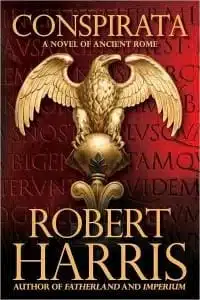
Robert Harris’s Conspirita: A Novel of Ancient Rome (published last year in the UK as Lustrum) is the second installment in a projected trilogy dealing with Rome’s transition from republic to empire in the first half of the first century B.C.
This is, of course, well-travelled territory in a range of media and genres: historical accounts (both academic and popular), mystery novels (Steven Saylor’s Roma Sub Rosa series is a recent example), films, and television series (most recently HBO’s Rome). Even Shakespeare evinced a fascination with the political trials and tribulations of ancient Rome’s identity crisis in Julius Caesar, a near universal installment in the curricula of high school English departments, as well as in the less frequently read Antony and Cleopatra.
Clearly the subject matter is inexhaustible and this presents writers — of history and fiction alike — with both opportunities and challenges. On the one hand, they can expect to speak to an established audience; on the other, they have the difficult task of bringing some new knowledge, perspective, or interpretation to events that scholars and writers — some obscure, others renowned — have contemplated for over 2000 years.
Conspirita meets this challenge with two essential strengths. First, it reflects a truly impressive knowledge of the dizzyingly complex political machinations, plots and counter-plots, conspiracies, shifting alliances, and manipulations that were par for the course in the period. Second, Harris orients the novel around Marcus Tullius Cicero, who, while by no means obscure, is hardly a titanic figure like Julius Caesar and Gnaeus Pompey — whose vaunting ambition, military and political triumphs, and, ultimately, spectacular demises still have the power to astonish. For his part, Cicero was a successful lawyer and orator famed for his eloquence and rhetorical prowess; indeed, his letters and literary works are mainstays of Latin classes at both the high school and college level.
Cicero was also, however, an ambitious and savvy politician, a member of the Roman senate who put him himself at the very center of conflicts and conspiracies with great risk to his reputation and life. This is the Cicero Harris seeks to recover in his trilogy. Our window onto the world of this complex individual is his slave, secretary, and amanuensis Tiro, who has gone down in history as the inventor of a system of short hand that facilitated the recording of speeches in the Roman senate and courts of law and as the writer of a now lost history of Cicero’s life comprised of four volumes. (Though Conspirita can be read as a stand-alone novel familiarity with the first novel in the series, Imperium, is helpful for grounding the reader in the premise of Conspirita, the historical situation it addresses, and the cast of characters it presents.)
Conspirita traces the arc of Cicero’s career from its zenith, which coincided with his election to the consulship of Rome and his prosecution of the case against Cataline who allegedly plotted to overthrow the republic, to the beginning of its decline. Along the way we see the abilities that make possible Cicero’s success — brilliant intellect, quick wit, relentless determination, and unstoppable energy — and the flaws that facilitate if they do not exactly cause the change in fortunes that take place in the single year the novel presents — self-satisfaction, egoism, and an inability or unwillingness to acknowledge just how fickle are the sentiments of the Roman people.
Still, if Harris’ Cicero falls short of perfection, he is still a sympathetic figure — at least as viewed through the eyes of Tiro, who remains completely loyal to and generally admiring of his master even when he is frustrated by or bewildered with his decisions.
At the same time, while the historical exactness and erudition of Conspirita are admirable — and undergird what feels like a comprehensive portrait of Cicero — they occasionally compromise its effectiveness as a novel. In other words, because its aim is to offer an account of a Cicero’s life, or at least its most important period, the novel tends to move from set piece to set piece of high drama without an exact through line, as in, “Cicero did this and then some months passed and he did this.”
In all fairness, though, if the plot sometimes lags it is because Harris is admirably responsible to the historical record and is willing to let the life speak for itself — or at least to let the half-historical/half-fictional Tiro speak for it.
